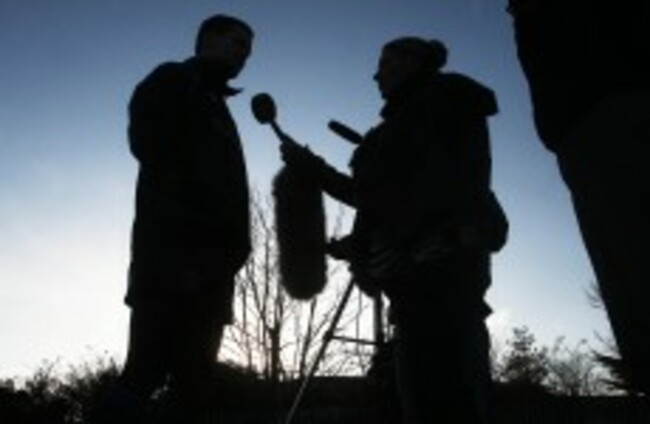6. “His leg caught between the fire ladder and the wall. He knew right away it was broken. He dangled from the fire escape like a bat—except bats can let go. He tried calling for help but his voice was too weak from the cancer treatments; he could barely whisper. Also, he wanted that fucking cigarette. A security guard, ducking out for his own smoke, found him, and it took another 20 minutes before the paramedics could get George on his feet. They wanted him to go to the hospital for X-rays but George talked them out of it. His wife was a doctor, he explained, and with all the chemo, he had more than enough painkillers at home.”
Deadspin remember George Kimball – who you might know from the Irish Times and Off the Ball, of course – with this brilliant piece.
5. “There were echoes in old Roy’s prognosis of the MUTV outburst that hastened his departure in November, 2005. Then, too, he played the role of alternative manager, dismayed by the inadequacies of younger men lucky enough to share his air space. The big problem with this swipe at the team who crashed out at the group stage in Switzerland, it seems to me, is that it merely offered the accuser a chance to fantasise about lost power. Ten years ago, Keane could have barged through that dressing room, indulging his tendency to belittle and to blame.”
You may not agree with him, but Paul Hayward - in his new home at the Telegraph – is worth a read on Roy Keane’s post-Basle punditry.
4. “Opportunity and obligation had collided, the way they can in hockey. His father bought a program the night before. Boogaard scanned the roster, checking heights and weights. He later recalled that he barely slept. A trainer in the dressing room offered scouting reports. As Boogaard taped his stick in the hallway of the rink in Regina, Saskatchewan, he was approached by one of the few players bigger than he was. Boogaard had never seen him before. He did not know his name. ‘I’m going to kill you,’ the player said.”
You need to read this piece, The New York Times examines the life and death of hockey ‘enforcer’ Derek Boogaard, who rose to fame as one of the sport’s most feared fighters before dying at age 28 this year.
3. “To play consistently successful Moneyball, you have to stay ahead of the curve, and that’s hard. The next generation of Moneyballers may well use sophisticated artificial-intelligence methods to gain an edge, just as the IBM-programmed Watson machine beat Ken Jennings at Jeopardy!. Pencil-and-paper statistics, or even simple computer techniques, have become the new status quo to be beaten, just as Beane showed up the crusty, old-time baseball scouts who relied on their seat-of-their-pants intuition. It is not surprising that innovative, profitable baseball strategies remain undiscovered or are discovered slowly. Management resists innovations that may, soon enough, call for new managers. New Moneyball ideas are easily copied by other teams, so why bother? Finally, baseball is a closed network of teams facing limited outside competition, and that makes innovation less urgent.”
Tyler Cowen and Kevin Grier at Grantland examine whether the principles of Moneyball stand up.
2. “My mind is in a complete whirl. Speedo is a big mate. I’ve got three chapters of his autobiography sitting in my bottom drawer. We often meet in his local for a chat, both living in the area. He and his lovely wife Louise joined us on a boat on the River Dee to help celebrate our wedding just over four years ago. This has got to be one of the sickest rumours that has ever circulated around the football world…surely? But the fact that Chris had heard it from two different sources put me on edge. I rang a mutual mate, fellow Welshman Ian Rush. He would be able to nail these stories. He was in Dubai and the way he answered his phone suggested the worst case scenario. Normally he would be ready with a quip. This time it was a solemn ‘Hi Ricco’. ‘You’ve heard the rumours Rushy about Speedo?’ I replied. ‘Yeah, I think they’re true mate,’ were the words I will never forget.”
This isn’t particularly poetic or well written to be honest, but John Richardson‘s blog about his daily routine gives an honest, worthwhile insight into a week in which his friend Gary Speed died.
1. “Behold the decomposed remains of the sports interview. Stand before it as one of 32 starting quarterbacks in the NFL, one of the most over-covered entities in the most over-covered sport. It is a midseason Thursday, the day you give your weekly local press conference on the practice field. Witness the assembled members of the press jockeying for position, violating every known law of personal space to get their microphones and cameras in prime position, with little or no regard for body parts belonging to you or anyone else. Once positioned, the demands begin. That’s right — demands.”
ESPN Tim McKeown laments the death of the old-school, sit-down interview in sports media.

